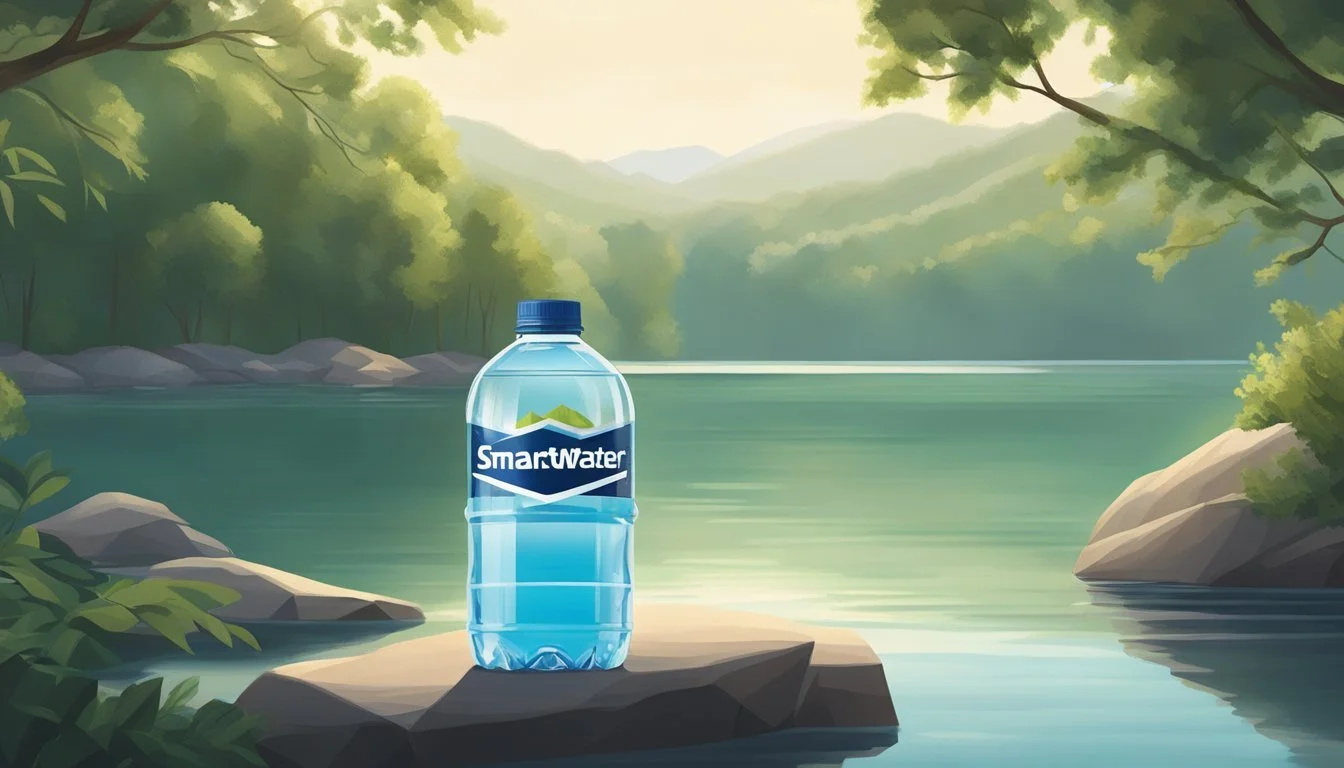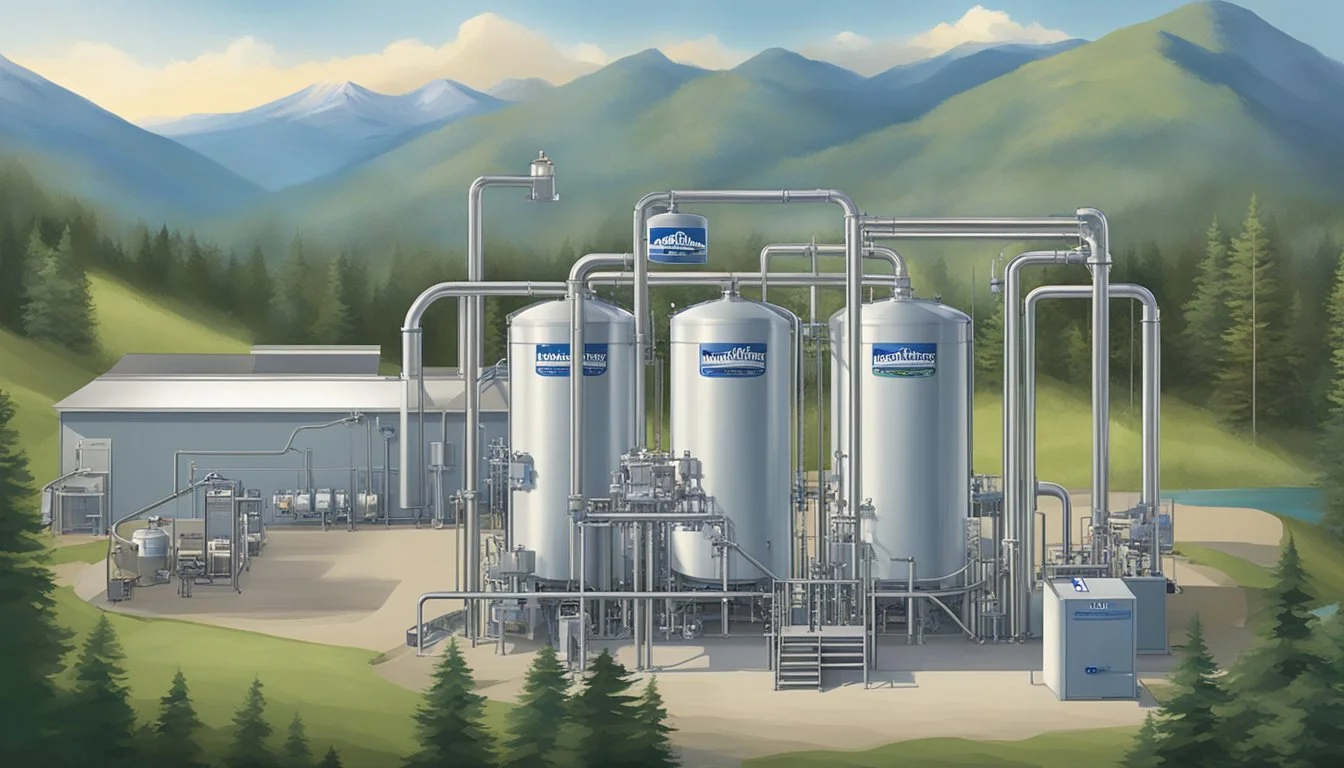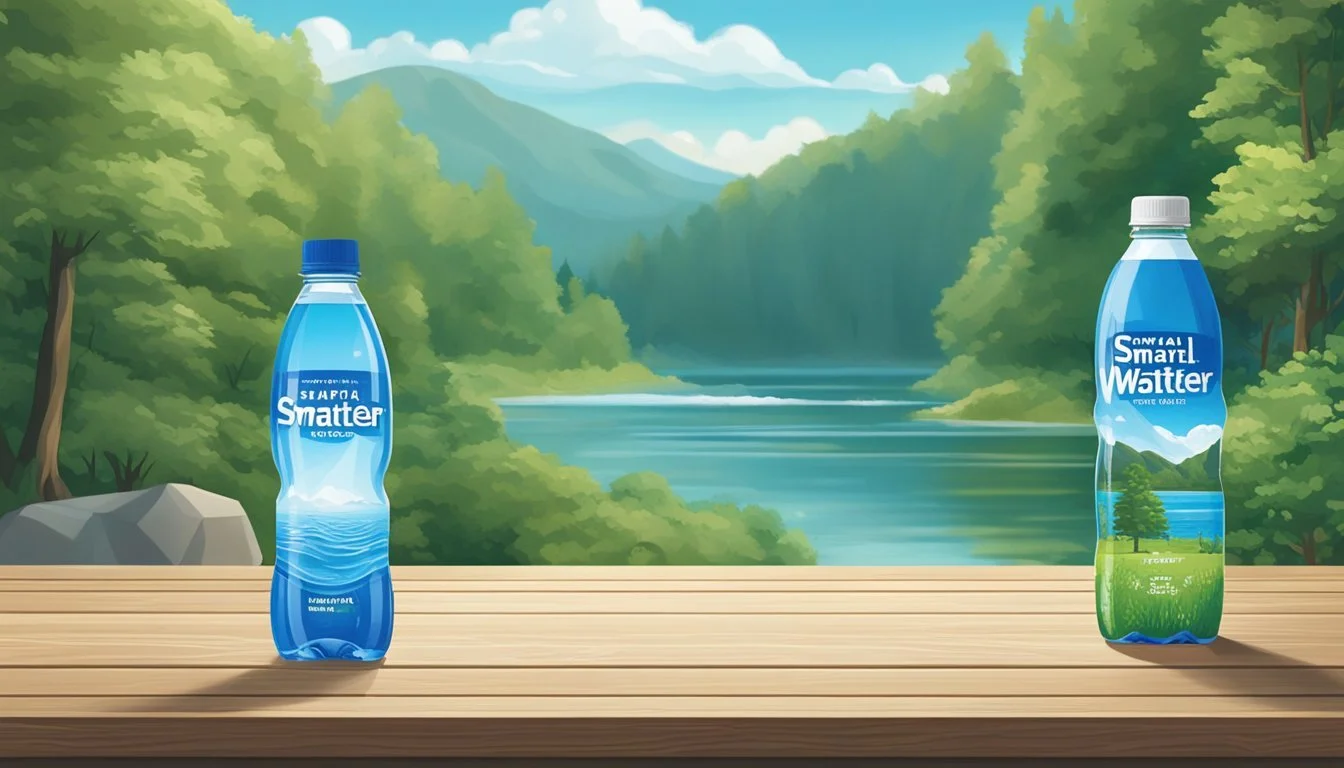Smartwater vs. Crystal Lake
A Comprehensive Comparison of Bottled Water Brands
When choosing bottled water, many are familiar with popular brands like Smartwater and Crystal Lake. Both brands promise to offer hydration benefits, but how do they really compare? Smartwater is known for its vapor-distilled purification process and added electrolytes, aiming to provide a clean and crisp taste.
Crystal Lake, on the other hand, touts its natural spring water sources, which may offer a more authentic and mineral-rich hydration experience. In terms of overall health benefits, Crystal Lake's natural minerals could give it an edge over Smartwater's manufactured purity.
For those who prioritize convenience and a pristine taste, Smartwater might be the go-to choice. For individuals looking for naturally sourced hydration with possible added health benefits, Crystal Lake could be the better option.
Understanding Bottled Water
Bottled water comes in various categories and is sourced from diverse locations. The materials used for packaging and their environmental impact are also crucial considerations for consumers.
Categories of Bottled Water
Bottled water is classified into several categories. Purified water, such as Aquafina and Dasani, undergoes a treatment process that removes impurities. Spring water, like Poland Spring and Crystal Geyser, is sourced from natural springs and often contains beneficial minerals.
Mineral water brands such as Evian and Fiji naturally contain minerals. Artesian water, found in brands like Voss and Fiji, comes from confined aquifers. Each category offers distinct benefits, be it the purity of purified water or the natural mineral content in mineral water.
The Significance of Water Sources
The source of bottled water greatly influences its taste and quality. For instance, Crystal Geyser sources its water from springs in California and Maine. Fiji Water originates from an artesian aquifer in Fiji, contributing to its unique mineral profile.
Evian and Mountain Valley Spring Water are known for their pristine water sources. Nestlé Pure Life, on the other hand, sources from multiple locations, stressing consistency. The source affects mineral content, which can enhance hydration and taste.
Packaging Materials and Environmental Impact
Packaging materials have significant environmental repercussions. The majority of bottled water uses plastic bottles, which raise concerns about sustainability. Brands like Ethos Water and Pure Life are focusing on recyclable plastic bottles.
Glass bottles, used by some high-end brands like Voss, are more environmentally friendly but less convenient. Companies are increasingly moving towards sustainable packaging to reduce environmental footprints. Core Hydration and LIFEWTR are examples of brands adopting eco-friendly practices without compromising convenience or quality.
Quality and Safety Standards
Ensuring bottled water meets stringent quality and safety standards is crucial. This section covers how Smartwater and Crystal Lake adhere to regulations and compares their contaminant levels.
Regulation and Compliance
Both Smartwater and Crystal Lake must comply with the FDA regulations, ensuring their water is safe for consumption. Smartwater goes through a rigorous process involving reverse osmosis to remove impurities.
Crystal Lake also performs multiple filtration steps, adhering to federal and state guidelines. The Environmental Working Group (EWG) often analyzes bottled water brands to ensure compliance with safety standards. Both brands ensure their bottles are BPA-free to prevent chemical leaching.
Comparison of Contaminant Levels
Smartwater boasts minimal contaminants due to reverse osmosis and extensive filtration. They specifically highlight reduced levels of fluoride, chloride, chromium, and sodium.
Crystal Lake, known for its natural mineral content, shows slightly higher levels of magnesium, calcium, and potassium, beneficial for health. While both brands maintain low contaminants in comparison to tap water, the levels are meticulously monitored and published in annual water quality reports, ensuring transparency and safety.
Comparative testing, like those done by Consumer Reports, confirms both brands' commitment to maintaining safe contaminant levels, making them reliable options for clean and safe drinking water.
Brand Analysis
Smartwater and Crystal Lake are two prominent bottled water brands, each offering distinct qualities in terms of taste, marketing, and environmental impact.
Smartwater Profile
Smartwater, produced by Glaceau and owned by Coca-Cola, is known for its crisp and clean taste. It undergoes a rigorous vapor distillation process, which mimics the hydrological cycle, resulting in pure water that is enriched with electrolytes for taste.
Electrolyte Composition:
Calcium chloride
Magnesium chloride
Potassium bicarbonate
These electrolytes give Smartwater a unique taste and are marketed as beneficial for hydration.
Smartwater's marketing strategy emphasizes purity and premium quality, targeting health-conscious consumers. Its sleek bottle design and availability in various sizes make it a convenient choice for different preferences. Although the use of plastic packaging has been criticized for its environmental impact, Smartwater has been exploring more sustainable options.
Crystal Lake Brand Overview
Crystal Lake aims to compete in the premium bottled water market by offering high-quality and pure water. The brand focuses on sourcing from natural springs, which is a key selling point for consumers who prioritize natural water sources.
Key Features:
Natural spring water
Minimal processing
Appealing packaging
The taste of Crystal Lake water is often compared to other premium brands like Fiji Water and Evian, with many consumers noting its refreshing and clean flavor. The brand's packaging is designed to be visually appealing, similar to Smartwater and other high-end brands.
Crystal Lake places emphasis on environmental concerns, with efforts to use recyclable materials in their bottles. This aligns with growing consumer demand for environmentally friendly products.
Competitor Overview
When evaluating Smartwater and Crystal Lake against other water brands such as Aquafina, Dasani, and Nestlé Pure Life, several factors come into play. These include taste, source, and eco-friendliness.
Popular Brands:
Aquafina: Known for its affordability and wide availability.
Dasani: Another major brand by Coca-Cola, often criticized for its artificial taste.
Nestlé Pure Life: Despite being the largest bottled water corporation, it has mixed consumer reviews regarding taste.
Brands like Evian, Fiji Water, and Icelandic Glacial offer strong competition in the premium segment due to their natural sourcing and minimal processing. Poland Spring and Deer Park, on the other hand, are recognized for their regional spring water offerings.
Comparatively, Smartwater's unique distillation process and Crystal Lake's natural spring sourcing position them as notable options in the crowded bottled water market. Both brands appeal to specific consumer preferences, whether it be for taste, source, or environmental impact.
Health and Hydration
Hydration and the mineral content of bottled water are both critical factors influencing the choice between Smartwater and Crystal Lake.
Benefits of Hydration
Hydration is vital for maintaining the body's functions. Drinking adequate water supports numerous physiological processes including digestion, circulation, and temperature regulation. Dehydration can lead to symptoms such as fatigue, headaches, and impaired cognitive function.
Smartwater and Crystal Lake both aim to provide pure and refreshing hydration. Smartwater is known for its vapor-distillation process, which removes impurities and potentially harmful contaminants. This results in a clean and crisp-tasting water that meets high standards of purity.
Crystal Lake offers its own promise of clean hydration, with a focus on natural purity and balance. The key is to choose water that aligns with one's daily hydration needs and health goals.
Minerals and Electrolytes
Minerals and electrolytes play a significant role in the benefits of bottled water. Smartwater contains added electrolytes, such as calcium chloride, magnesium chloride, and potassium, which enhance flavor and support better hydration. Electrolytes are essential for nerve function, muscle contraction, and maintaining fluid balance within the body.
Crystal Lake, on the other hand, boasts a natural mineral content, derived from its natural sources. These may include magnesium and calcium, both crucial for bone health, muscle function, and metabolic activity.
Distilled water, such as Smartwater, is often free from natural minerals, and thus relies on added electrolytes to provide these nutrients. Conversely, mineral water like Crystal Lake might offer an inherent blend of essential minerals, contributing to a well-rounded hydrating experience.
These differences in mineral content and electrolyte presence can significantly influence the hydration benefits they each provide. While Smartwater offers controlled, added electrolytes for balanced hydration, Crystal Lake offers naturally occurring minerals for a unique and holistic approach.
Taste and Palate
In comparing the taste of Smartwater and Crystal Lake, it's essential to consider several factors such as pH levels and the distinct flavor and texture profiles these waters offer.
The Role of pH in Taste
pH levels significantly impact the taste of bottled water. Smartwater boasts a slightly alkaline pH of around 7.4, which provides a crisp and clean taste. This level of alkalinity is achieved through vapor distillation and the addition of electrolytes.
Crystal Lake, on the other hand, has a pH level that typically ranges between 6.8 to 7.2. This more neutral to slightly acidic pH gives it a subtler taste that some may find more refreshing. The pH also affects whether the water has a more metallic or smooth feel on the palate.
Texture and Flavor Profiles
Texture and flavor are just as important as pH in determining water preference. Smartwater is known for its silky texture, achieved through a meticulous purification process involving vapor distillation. Added electrolytes like potassium and calcium contribute to a rounded flavor profile without overpowering the taste buds.
Crystal Lake water is often described as having a fresher and lighter texture. Its natural filtration process preserves minerals that enhance its flavor, making it taste slightly more earthy compared to Smartwater. The presence of these minerals contributes to a fuller mouthfeel and can make it a preferable choice for those seeking a more natural taste.
Consumer Perception and Choices
When comparing Smartwater and Crystal Lake, consumers consider several critical factors that influence their buying decisions. These include the pricing of the products, the effectiveness of marketing strategies, brand loyalty, and packaging convenience.
Pricing and Affordability
Smartwater tends to be positioned as a premium brand, often reflected in its pricing. It markets itself with added electrolytes for taste and a refined purification process, contributing to its higher price point.
In contrast, Crystal Lake often provides a more affordable option, appealing to budget-conscious consumers. While it may not have the same premium perceptions as Smartwater, it offers good quality at a lower price point, making it accessible to a broader audience.
Marketing and Brand Loyalty
Smartwater invests heavily in marketing, often utilizing celebrity endorsements and high-profile advertising campaigns. This extensive marketing strategy helps build strong brand loyalty among consumers who associate Smartwater with quality and prestige.
Crystal Lake, on the other hand, may rely more on its reputation for affordability and reliability. It might not have the same level of brand loyalty as Smartwater but appeals to a demographic looking for a trustworthy and cost-effective option.
Packaging and Convenience
The packaging plays a crucial role in consumer choices. Smartwater uses sleek, modern packaging that emphasizes its premium positioning. Its plastic bottles are BPA-free, appealing to health-conscious consumers concerned about chemical leaching.
Crystal Lake focuses on practicality with straightforward, no-frills packaging. It may not boast the same aesthetic appeal, but its bottles are often designed for ease of use and convenience, making them suitable for various settings like picnics or sports events.
Environmental Considerations
When comparing Smartwater and Crystal Lake, it's crucial to consider the environmental impacts of their production, as well as their sustainability practices.
Impact of Bottled Water Production
The production of bottled water has significant environmental implications. Plastic bottles, often made from polyethylene terephthalate (PET), require petroleum to produce, contributing to carbon emissions. Additionally, the manufacturing process consumes large amounts of water, sometimes up to three times the amount of water that ends up in the bottle itself.
Smartwater and Crystal Lake both use plastic bottles, which can leach chemicals over time. Substances like BPA (bisphenol A) have been linked to health concerns, although many companies now claim their bottles are BPA-free. Despite this, plastic bottles remain a pollutant, taking hundreds of years to decompose in landfills.
Sustainability and Bottled Water
Sustainability efforts in the bottled water industry vary greatly. Some brands are exploring alternatives like glass bottles or boxed water to reduce plastic waste. CG Roxane, the company behind Crystal Lake, has been implementing measures to lessen their environmental footprint, including water conservation initiatives and using recycled materials.
Smartwater also claims to support sustainability by optimizing packaging and promoting recycling. Both brands encourage consumers to recycle their bottles, yet the effectiveness of these programs depends largely on local recycling facilities and consumer behavior.
In summary, both Smartwater and Crystal Lake have room for improvement in their environmental practices. Moving towards more sustainable options, like glass or boxed water, and enhancing recycling programs can significantly reduce their ecological impact.
Innovation and the Future of Bottled Water
Innovations in bottled water technologies are continuously evolving to provide cleaner, healthier, and more sustainable options. These advancements include refined purification techniques and new trends in bottled water products.
Advancements in Water Purification
Purified water technologies have seen significant progress, with methods such as reverse osmosis leading the way. This process forces water through a semipermeable membrane, removing impurities and contaminants. Brands like Smartwater often use vapor distillation, a technique that mimics the natural hydrological cycle by evaporating water and condensing it, resulting in highly purified water.
Electrolytes are commonly added to enhance taste and provide health benefits, a practice employed by brands like Gatorade and Smartwater. Alkaline water, with its higher pH level, is another growing trend, believed to help neutralize acidity in the body. Additionally, artesian water, sourced from confined aquifers, is gaining popularity for its naturally occurring minerals.
Emerging Bottled Water Trends
Modern consumers are increasingly favoring eco-friendly products, pushing companies to innovate in packaging. Reusable and biodegradable bottles are becoming mainstream. Some brands are even exploring plant-based plastics and returnable glass bottles to reduce environmental impact.
Another trend is the rise of flavored and functional waters, which include added vitamins, minerals, and even caffeine. Brands are also exploring new water sources, such as deep ocean water and glacial water, marketed for their purity and unique mineral content. These options aim to cater to a diverse range of consumer preferences, exemplifying the dynamic future of the bottled water industry.
More About Smartwater
Core Hydration vs Smartwater: Which Bottled Water is Better?
Icelandic Glacial vs Smartwater: Which Bottled Water is Better?
Mountain Valley Spring Water vs Smartwater: Which Bottled Water is Better?
Nestle Pure Life vs Smartwater: Which Bottled Water is Better?
San Pellegrino vs Smartwater: Which Bottled Water is Better?
Smartwater vs Aqua Carpatica: Which Bottled Water is Better?
Smartwater vs Cascade Mountain: Which Bottled Water is Better?
Smartwater vs Crystal Geyser: Which Bottled Water is Better?
Smartwater vs Hawaii Volcanic: Which Bottled Water is Better?
Smartwater vs Hawaiian Springs: Which Bottled Water is Better?
Smartwater vs Kirkland Signature: Which Bottled Water is Better?
Smartwater vs Richard's Rainwater: Which Bottled Water is Better?
Smartwater vs Solan de Cabras: Which Bottled Water is Better?
Smartwater vs Talking Rain AQA: Which Bottled Water is Better?
Smartwater vs Whole Foods 365: Which Bottled Water is Better?
Smartwater vs Whole Foods Italian Still Mineral water: Which Bottled Water is Better?
More About Crystal Lake
Aqua Carpatica vs Crystal Lake: Which Bottled Water is Better?
Cascade Mountain vs Crystal Lake: Which Bottled Water is Better?
Core Hydration vs Crystal Lake: Which Bottled Water is Better?
Crystal Geyser vs Crystal Lake: Which Bottled Water is Better?
Crystal Lake vs Essence pH10: Which Bottled Water is Better?
Crystal Lake vs Proud Source: Which Bottled Water is Better?
Hawaii Volcanic vs Crystal Lake: Which Bottled Water is Better?
Hawaiian Springs vs Crystal Lake: Which Bottled Water is Better?
Ice Mountain vs Crystal Lake: Which Bottled Water is Better?
Icelandic Glacial vs Crystal Lake: Which Bottled Water is Better?
Kirkland Signature vs Crystal Lake: Which Bottled Water is Better?
Liquid Death vs Crystal Lake: Which Bottled Water is Better?
Mountain Valley Spring Water vs Crystal Lake: Which Bottled Water is Better?
Nestle Pure Life vs Crystal Lake: Which Bottled Water is Better?
Poland Spring vs Crystal Lake: Which Bottled Water is Better?
Purely Sedona vs Crystal Lake: Which Bottled Water is Better?
Richard's Rainwater vs Crystal Lake: Which Bottled Water is Better?
San Pellegrino vs Crystal Lake: Which Bottled Water is Better?
Simple Truth vs Crystal Lake: Which Bottled Water is Better?
Solan de Cabras vs Crystal Lake: Which Bottled Water is Better?
Talking Rain AQA vs Crystal Lake: Which Bottled Water is Better?
Whole Foods 365 vs Crystal Lake: Which Bottled Water is Better?
Whole Foods Italian Still Mineral water vs Crystal Lake: Which Bottled Water is Better?







